Hey, friends! Barbarella here. Have you ever given much thought to early modern man? I admit that I really hadn’t until seeing OUT OF DARKNESS, a film about a group who migrates to a new land in a time 45,000 years before the modern conveniences we take for granted today. Director Andrew Cumming takes cast and crew to remote Scotland to shoot the horror film, which will be in theaters Friday, February 9, 2024.
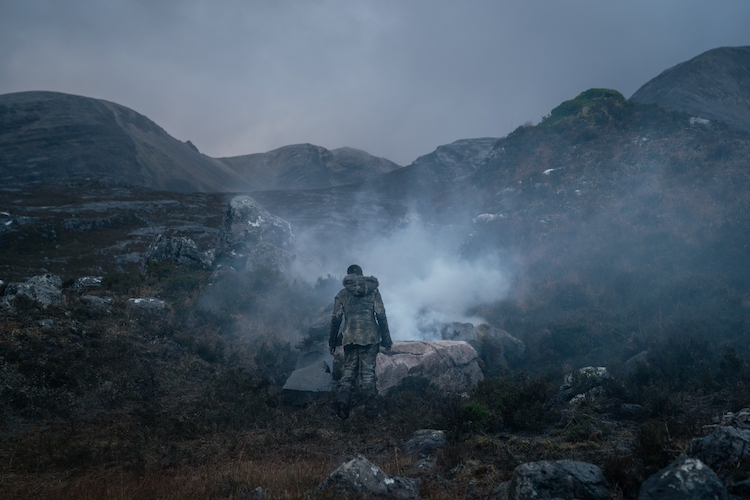 OUT OF DARKNESS has a unique score that I absolutely love. It perfectly complements what's happening on the screen. Another unique element of the movie is the language, which was developed specifically for it. Those of you who dislike subtitles, don’t worry. There’s not a ton of talking. I find the performances, scenery, and alluring score engaging. OUT OF DARKNESS is not without its message, and while I want a movie to have something worthwhile to say, I generally tend to be put off when an idea is so blatantly shoved down my throat. That said, surprisingly, I’m not all that annoyed by how clearly its message gets presented and reiterated at the end.
OUT OF DARKNESS has a unique score that I absolutely love. It perfectly complements what's happening on the screen. Another unique element of the movie is the language, which was developed specifically for it. Those of you who dislike subtitles, don’t worry. There’s not a ton of talking. I find the performances, scenery, and alluring score engaging. OUT OF DARKNESS is not without its message, and while I want a movie to have something worthwhile to say, I generally tend to be put off when an idea is so blatantly shoved down my throat. That said, surprisingly, I’m not all that annoyed by how clearly its message gets presented and reiterated at the end.
I had an opportunity to chat across the pond via the magic of technology with Andrew Cumming and two of the film’s actors, Safia Oakley-Green and Kit Young. Check it out!
Barbara: My first question is for Andrew. Did you just really want to go make a movie in some remote location, or what was the impetus for this story?
Andrew: (jokingly) Yes, I hate people so that’s why. The impetus for the story is I was finishing film school, and I watched a documentary by the BBC called [The Origins of Us]. The first episode was about early modern humans migrating out of Africa into Western Europe, and I just thought it was a really compelling time period that had been underserved in films. I didn’t really think anything more of it, and then I read William Golding‘s follow up to “Lord of the Flies,” a book called “The Inheritors,” which was a fantastic novel. I won’t spoil it. But again, it’s set in the same time period and a very compelling read. When I finished it, I had this epiphany about us as a species and what we’re capable of, and what we do to people that we don’t understand, and the uncomfortable truth that that’s why we are the top of the food chain – this idea that humans have survived because of our inhumanity, and how icky and gross that is as a topic to discuss.
Andrew (cont.): Then, I met Oliver Kassman, the film’s producer, and he said he was interested in something in the Paleolithic period but with a horror twist, and that was when the lightbulb went off, and I was like “Yes, if you match that genre and the opportunities that genre provides you with this time period, you could film some mayhem, but it has something to say.” Then he and I concocted this little three-page thing, and somehow Ruth Greenberg, the writer, took pity on us she said, “I see where you’re going with this, and I’ll take it and run with it.” The three of us set off on that adventure - literal adventure - because before Ruth wrote a page of the script, the three of us went up to the northwest of Scotland, where we eventually shot the movie. Some of the adventures we got into there made it into the film, so it was a very organic process that started from a point of this could be an interesting world to discover.
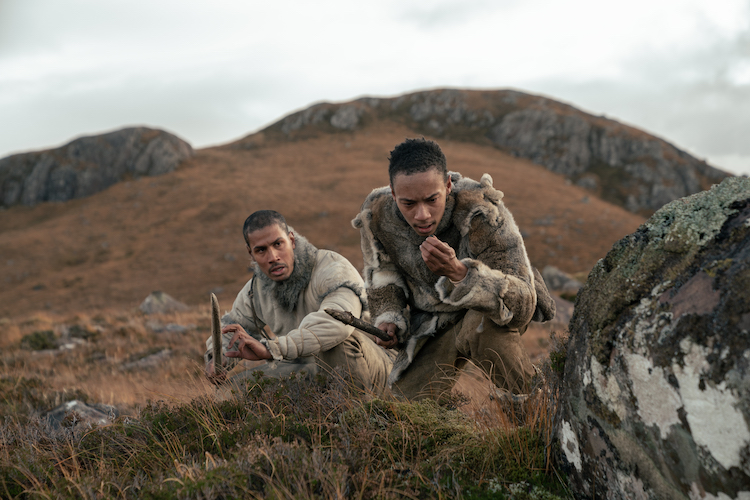 Kit: What on earth did you do up there?
Kit: What on earth did you do up there?
Andrew: Oh what didn’t we do? That’s a whole other podcast.
Barbara: Speaking of the location, what were the conditions like, and what was that like filming for you?
Kit: Andrew and everybody behind the camera had the benefit of choosing what to wear for the conditions we were in. Listen, it was extreme for all of us. It’s such a beautiful part of the world, but we went in winter. Sometimes the weather just went “Screw you.” I remember there was one time, in particular, the weather was so bad that we had to reschedule when we were going. The road we’re gonna take, we can’t do because the rain has taken the road away, so there’s no road.
Andrew: Yeah, we spent £5,000 to resurface this road, and the next day the rain washed that £5,000 away. Sorry, I digress.
Kit: So, we were already in it, so in terms of immersion and what you capture on camera is brilliant. It definitely kind of thickened our skin. If you could imagine putting all of your warmest clothes on, your woolliest outfits, and then turning a cold shower on and standing in that shower for eleven hours, that was a lot of our days. But come two hours in, you don’t really take note anymore; you’re just wet, so you continue to just do what you’re doing. It was really intense, but it’s kind of what makes us all bond together, because we’d all come back to the hotel, cast and crew, and we went, “We survived. Let’s go again tomorrow.” You know, it was great.
Barbara: Safia, do you have anything you’d like to add?
Safia: Yeah, I mean exactly what they said. It was cold, but it was amazing, and everyone was going through it together. We were in furs, which you would imagine would be warm, but like Kit says, not when they’re wet.
Kit: And they were heavy, too.
Safia: Yes, we really got very, very weathered, as the people would’ve done. That really helped with the performance because it really got into our body, got into our skin; we felt huffy. We felt hard from tensing in the cold. We felt all of these things which you would’ve had to cultivate in a studio, which we didn’t have to do; the landscape gave that to us, so we didn’t have to think about showing all of these those things because we were just feeling them, and that made our job definitely easier.
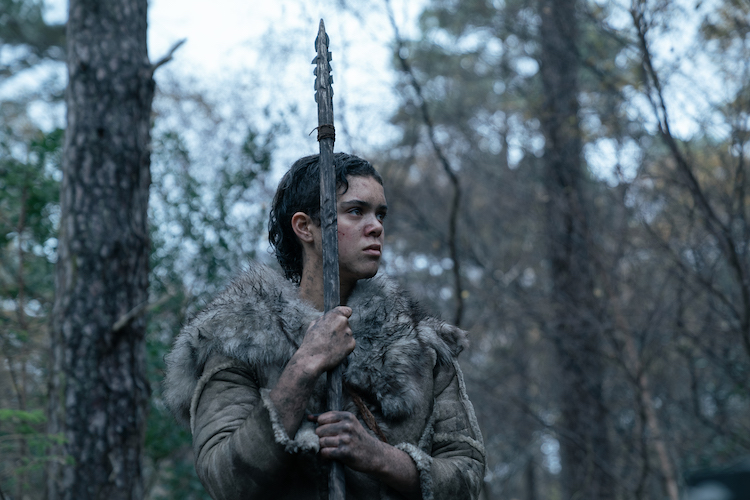 Andrew: It’s quite a difficult place to be as a director. Where on the one hand, you care deeply about these people’s welfare, but on the other hand, what you’re getting in the camera looks great.
Andrew: It’s quite a difficult place to be as a director. Where on the one hand, you care deeply about these people’s welfare, but on the other hand, what you’re getting in the camera looks great.
Barbara: Regarding the language, would you talk a little bit about how that was developed, and for Kit and Safia, how was it learning that?
Andrew: Oliver knows Dr. Daniel Anderson, who is an academic and linguist and has a lot of experience translating papers and various Indo-European languages into English. Once we made the decision that we were going to go with a constructed language, we sent him the challenge based on human migration at West Africa going up. Some went into Western Europe. Some headed east. We took Basque, Sanskrit, Arabic, I think there’s some Nordic pronunciations and rhythms there in the language, and Daniel kind of worked backwards and took those and tried to create a root language from those, and within the space of four weeks, turned out this beautifully realized, perfectly structured language, and then the onus was on these guys to learn it.
Safia: Which wasn’t so bad. I don’t know about you, Kit, but [my character] Beyah doesn’t speak a whole lot in the movie. I remember looking through my line cues ‘cause Daniel recorded them all for us so we could listen to them and know how to pronounce them.
Kit: (playfully incredulous) What??? He did that for you?
Safia: He didn’t do that for you? Awwwww.
Kit: Okay, he did.
Safia: So, I think she only has less than sixty line-cues in the entire film, so that wasn’t so bad. I mean, as long as the intention was there, we had the audio recordings. I have vivid memories of this one morning, me and Iola [Evans] were sat in make-up together. In her dialogue, she says a word “rebala,” which means change, and then Iola said it, and she said “rebola,” and I was like “No, no, no. It’s rebala.” She said, “Well, I say it first, so whatever I say, you’re gonna have to say.”
Kit: Fair point.
Safia: It’s true; the people who say those words first on camera, they have made a choice, and that is how you say that word in that language. It was obviously all done in jest, and it was all fun, but it was like a big game; it was like a big six-week-long game. What about you, Kit?
Kit: Yeah, I had more than that to say, so I had more to panic about. No, I remember Chuku [Modu] had kind of a bit of a whirlwind situation in terms of getting cast, and it was very last minute in the end of all the deal being done and so forth. Daniel, the creator of the language, he really put me in it because I arrived the day after Chuku, and he came up to me and said, “Hey bro, nice to meet you. Daniel says that you know everything about the language, so teach me.” and I was like, “What? No. No, no. I know very little.” I’ve kind of worked out the first two pages, and there’s over 100 pages of script.
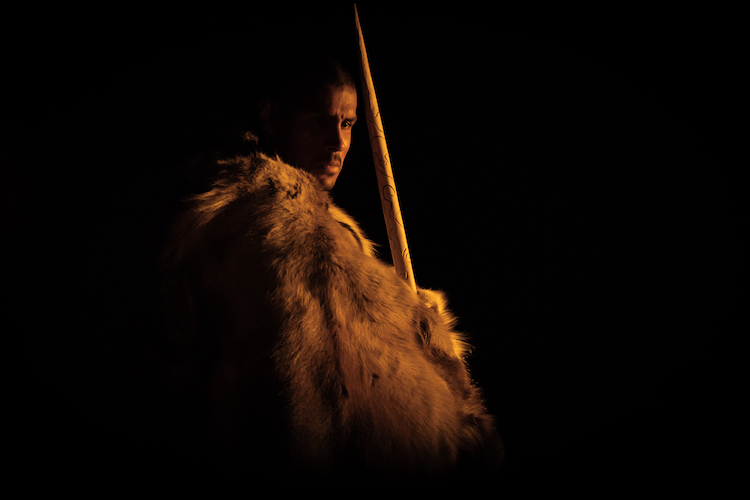 Andrew: That was two more than Chuku had. Right?
Andrew: That was two more than Chuku had. Right?
Kit: This is true. This is true. I did have a leg up. We all kind of muddled through it together. There was definitely an element of you say potayto, I say potahto, let’s call the whole thing off. There were so many phrases that we would all say, and so many phrases that also kind of are umbrella terms that would mean several different things. As long as those things had a continuity to it, when it then comes to things that were a bit rarer and only one person would say it, you just go “I’m not going to worry about what you’re saying, because if you look like you know what you’re doing, I will trust you, and then I’ll try and do my bit, and I’ll try to commit.” If someone comes in up here, you want to at least meet them. It’s all teamwork, and if someone was getting it wrong, you weren’t gonna be like, “Mm, sorry. Excuse me. I think, let’s do it again.”
Barbara: If you were hanging out and wanted to talk privately just amongst yourselves in the language, you wouldn’t be able to do that, would you?
Kit: Enough for us to feel like you’re being excluded? Yeah. We know enough to do that, and you wouldn’t know what we’re saying.
Andrew: Enough to make you feel shit
Barbara: (playfully exasperated) Actors!
Kit: (jokingly) You can’t sit with us.
Barbara: If you were suddenly transported back 45,000 years, how long would it take for you to die?
Safia: Who’s going to die first out of us three?
Kit: Of us three?
Safia: As ourselves, though, not as our characters.
Andrew: Hunting for food would be difficult, so I think I would last as long as… How long do you get without food?
Kit: You can live for a week with no food.
Andrew: Okay, I’m gonna say a week.
Kit: Are we assuming it’s the same climate as the film. We’re in that world?
Barbara: Yeah.
Kit: I think I’d last longer than that. I think I’d make it a solid two to three weeks, but I can’t attest to what might happen at night if you don’t have someone on watch. You need to have people with you that you trust, because if you go to sleep, and you’ve got no one with you, that’s when you’re really in trouble.
Safia: I grew up on THE HUNGER GAMES, so I have an inflated self-confidence, so I’m gonna say forever. I’m gonna say I never die.
Kit: I just spent six weeks with you out there. [You’d last] forty-eight hours.
Andrew: I think that’s being generous. I also think you’re probably gonna be the biggest risk taker of us.
Kit: So one week for Andrew. The length of a HUNGER GAMES movie for Safia.
Barbara: Really quickly, I want to talk about the score because I loved it. How did you go about working with the composer on that?
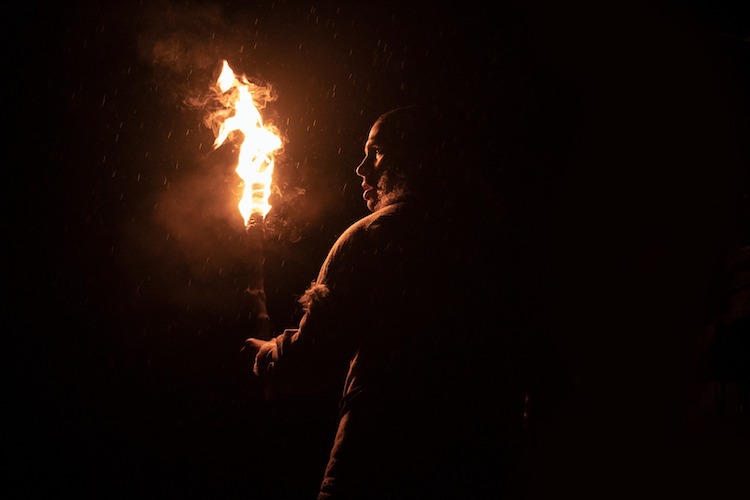 Andrew: Yeah, I met Adam [Janota Bzowski]. I thought he did a really great job on Saint Maud, Rose Glass’s debut. [He read] the script and really bought into the themes of what we were trying to do. I sent him the challenge of trying to create the score only using instruments that may be in that time period. I didn’t want to hear any strings, violins, all the usual kind of shrieky stuff you get in horror movies. The rule was to try to source these instruments, whether it’s bone flutes, kudu horns, conch shells, whatever. He then sort of electronically manipulated these things so that they created this whole soundscape. I thought it would be really cool to go back to that period to create something that could still feel contemporary and obviously could still sound violent and scary, and also moving. The last piece of music at the end, when one of the characters is reflecting on their misdeeds, I find that an incredibly moving piece of music. Adam’s got a lot of soul, but I think he would say himself he’s quite surprised how violent he can make those sounds, and I think the score is just great. It’s so bombastic; it’s in your face, but it also knows when to hold back and breathe, as well. I’m really pleased you asked about it, because I think it’s a great piece of work.
Andrew: Yeah, I met Adam [Janota Bzowski]. I thought he did a really great job on Saint Maud, Rose Glass’s debut. [He read] the script and really bought into the themes of what we were trying to do. I sent him the challenge of trying to create the score only using instruments that may be in that time period. I didn’t want to hear any strings, violins, all the usual kind of shrieky stuff you get in horror movies. The rule was to try to source these instruments, whether it’s bone flutes, kudu horns, conch shells, whatever. He then sort of electronically manipulated these things so that they created this whole soundscape. I thought it would be really cool to go back to that period to create something that could still feel contemporary and obviously could still sound violent and scary, and also moving. The last piece of music at the end, when one of the characters is reflecting on their misdeeds, I find that an incredibly moving piece of music. Adam’s got a lot of soul, but I think he would say himself he’s quite surprised how violent he can make those sounds, and I think the score is just great. It’s so bombastic; it’s in your face, but it also knows when to hold back and breathe, as well. I’m really pleased you asked about it, because I think it’s a great piece of work.
Barbara: Yeah, it’s fantastic.
Kit: Can I just quickly add [something]? There’s this one moment in the film where everybody I’ve watched it with has the same response. At the moment of the first death that we know is happening, there’s this brilliant merge of is that the sound of what’s happening or is that the score? There’s this merging of the two, and it hooks everybody. What’s quite funny about it, is that I’m going, “Oohhh,” and what I’m looking at on the screen is my face panicking, and I’m going, “He doesn’t know either!” The score is chef’s kiss. It’s brilliant.
Barbara: Definitely.
On that note (pun intended), we wrapped up our conversation. If you want to check out the film and its amazing score, OUT OF DARKNESS will be available in theaters on February 9, 2024.
Check out the trailer!
